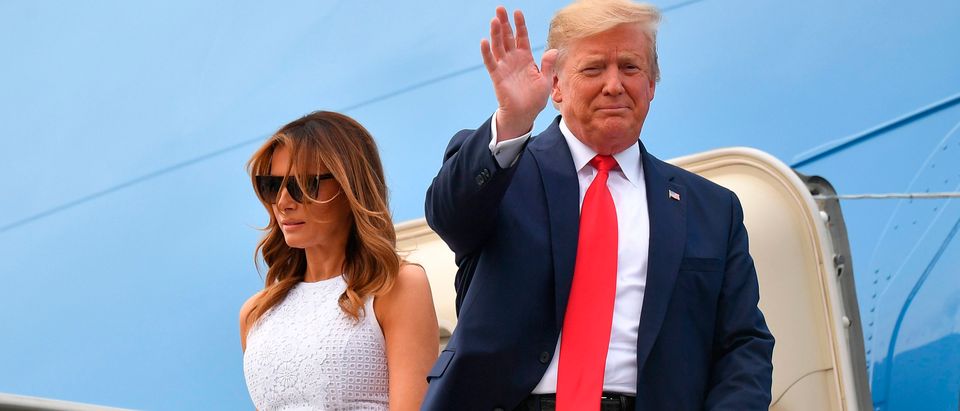President Trump’s July call with Ukrainian President Volodymyr Zelensky seems to have been the “straw that broke the camel’s back” for House Democrats’ long-running clamor to initiate impeachment proceedings. Whether Trump’s request for Zelenksy to investigate the role of Joe Biden’s son in a Ukrainian gas company was generally proper or violated any other laws, it assuredly did not violate any campaign finance laws.
Some — including the intelligence community’s inspector general — have alleged otherwise. This tendency to view every political act that one finds unsavory or disagreeable as a campaign finance violation has far-reaching and extremely harmful consequences for democratic government. Simply applying the theory on its face, it would inhibit a broad range of government actions by elected officials, as well as routine interactions between officials and constituents.
The argument that Trump’s request to Zelensky violated campaign finance laws is as follows: The law defines a “contribution” broadly as “anything of value made by any person for the purpose of influencing any election for Federal office.” The law also prohibits anyone from knowingly soliciting a “contribution” from a foreign national or foreign government. As Rick Hasen, an election law professor, argued in a column for Slate, Trump solicited a “thing of value” from Zelensky — a foreign national — to the extent the requested investigation would have politically damaged Biden, who appeared to be Trump’s leading Democratic rival in next year’s general election. (RELATED: Get Ready To See Trump’s Face On Mount Rushmore)
The problem with this theory is that it could convert a vast universe of governmental actions taken by elected officials into regulated campaign contributions or expenditures. With respect to candidates for federal office, the federal law specifically exempts spending by the federal government from regulation, and for good reason. Were it otherwise, the trillions of dollars that the federal government spends each year to benefit various voting constituencies could be deemed excessive and prohibited campaign contributions to the members of Congress who vote for such spending, or to the president who oversees such spending.
Indeed, many candidates make preserving, expanding, or creating new federal spending programs major parts of their campaign platforms.
However, absent a similar statutory exemption for spending by state and local governments, the Federal Election Commission has suggested that such spending could, in fact, result in campaign finance violations. Therefore, if the law were understood literally to regulate anything that could provide “value” to a government official’s election prospects as campaign spending, the legions of state officials who run for federal office or have ambitions of doing so would be in trouble. (RELATED: Trump Transcript Shows Him Trying To Stop Corruption, Nothing Else)
Any state attorney general who investigates or prosecutes a disfavored company and then runs on that record for Congress could be accused of funneling illegal state funds to her campaign. Any governor who expands state Medicaid spending and then runs on that record for president would similarly be in trouble.
This overbroad understanding of what constitutes campaign spending also would eviscerate the longstanding legal distinction between official and campaign events held by elected officeholders. Whether they are federal, state, or local officials, the law permits elected officials to hold events such as townhall discussions, meetings with civic groups, and bill-signing ceremonies so that they can solicit and share views on policy issues with constituents without the expenditures for such events being regulated as campaign spending. This is notwithstanding that many of these events very likely are, in effect, a “thing of value” to the participating officials’ election or reelection prospects.
In the seminal Buckley v. Valeo case, the U.S. Supreme Court recognized that “the ambiguity of [the] phrase” “for the purpose of influencing any election for Federal office” — to which the phrase “anything of value” is tethered in the “contribution” definition — “poses constitutional problems” (not to mention the practical ones illustrated above). While the Court’s attempt to narrow the “contribution” definition was still troublesome, the basic principle it articulated was sound: There must be bright-line, objective parameters on how we regulate or not regulate things as campaign contributions. (RELATED: Trump Is Handling The Presidency Like A Mafia Leader — That’s Why He May Get Impeached)
Based on the “readout” of the Trump-Zelensky call, which is the closest thing we have to a transcript, it does not appear that Trump explicitly (or even implicitly) tied the request for an investigation of Biden’s son to his reelection. Absent objective evidence that something is being solicited or provided but for its benefit to an elected official’s candidacy, it should not be viewed as a campaign contribution.
Otherwise, official actions by elected officeholders that they believe benefit society, but that also may benefit their reelections, could be prohibited.
Eric Wang is a political law attorney and senior fellow with the Institute for Free Speech. He previously served as counsel to FEC Commissioner Caroline C. Hunter.
The views and opinions expressed in this commentary are those of the author and do not reflect the official position of The Daily Caller.



